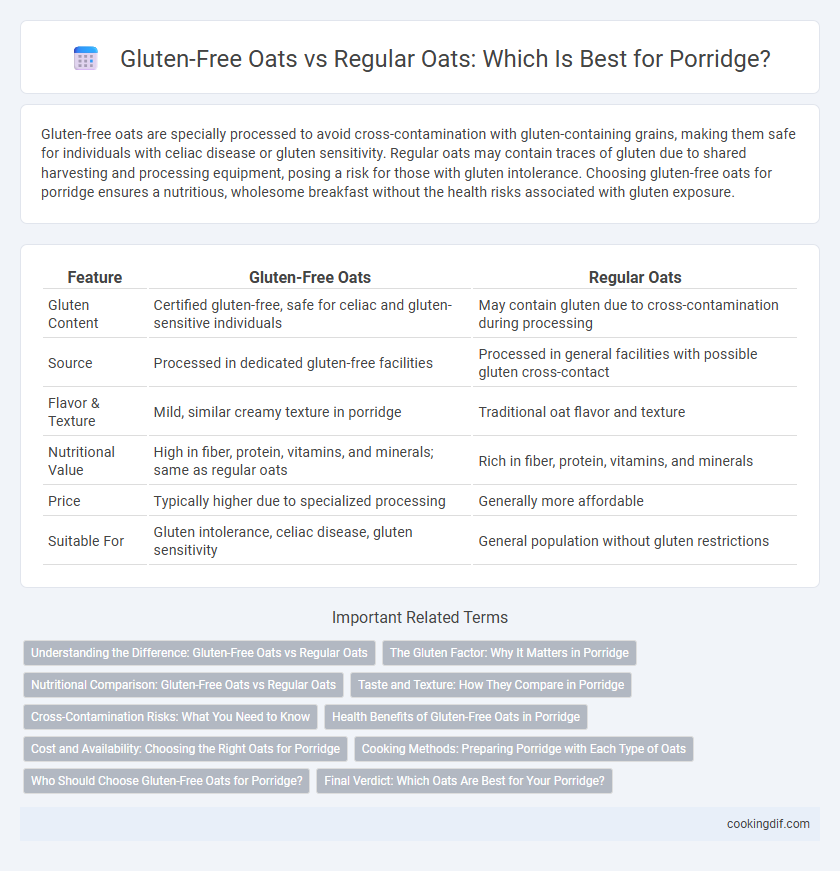Gluten-free oats are specially processed to avoid cross-contamination with gluten-containing grains, making them safe for individuals with celiac disease or gluten sensitivity. Regular oats may contain traces of gluten due to shared harvesting and processing equipment, posing a risk for those with gluten intolerance. Choosing gluten-free oats for porridge ensures a nutritious, wholesome breakfast without the health risks associated with gluten exposure.
Table of Comparison
| Feature | Gluten-Free Oats | Regular Oats |
|---|---|---|
| Gluten Content | Certified gluten-free, safe for celiac and gluten-sensitive individuals | May contain gluten due to cross-contamination during processing |
| Source | Processed in dedicated gluten-free facilities | Processed in general facilities with possible gluten cross-contact |
| Flavor & Texture | Mild, similar creamy texture in porridge | Traditional oat flavor and texture |
| Nutritional Value | High in fiber, protein, vitamins, and minerals; same as regular oats | Rich in fiber, protein, vitamins, and minerals |
| Price | Typically higher due to specialized processing | Generally more affordable |
| Suitable For | Gluten intolerance, celiac disease, gluten sensitivity | General population without gluten restrictions |
Understanding the Difference: Gluten-Free Oats vs Regular Oats
Gluten-free oats are processed in dedicated facilities to prevent cross-contamination with gluten-containing grains, making them safe for individuals with celiac disease or gluten sensitivity. Regular oats may contain traces of gluten due to shared equipment or fields where wheat, barley, or rye are grown. Choosing gluten-free oats ensures the porridge is free from gluten, providing a safe and nutritious option for those requiring gluten avoidance.
The Gluten Factor: Why It Matters in Porridge
Gluten-free oats provide a safe alternative for individuals with celiac disease or gluten sensitivity, preventing adverse reactions while maintaining porridge's creamy texture. Regular oats may be contaminated with gluten during processing, posing risks for those who require strict gluten avoidance. Choosing certified gluten-free oats ensures a nutritious, wholesome porridge without compromising health or taste.
Nutritional Comparison: Gluten-Free Oats vs Regular Oats
Gluten-free oats and regular oats offer similar nutritional profiles, both rich in fiber, protein, and essential vitamins like B-complex and minerals such as iron and magnesium. The key difference lies in gluten content; gluten-free oats are processed to avoid cross-contamination with gluten-containing grains, making them suitable for individuals with celiac disease or gluten sensitivity. Both types support heart health and blood sugar regulation, but gluten-free oats provide a safe alternative without compromising on nutrient density.
Taste and Texture: How They Compare in Porridge
Gluten-free oats offer a slightly nuttier flavor and a creamier texture compared to regular oats, enhancing the porridge's overall mouthfeel. Regular oats tend to have a chewier consistency and a milder taste, which some prefer for traditional porridge recipes. The subtle differences in taste and texture depend on oat variety and processing methods, impacting individual preference in porridge preparation.
Cross-Contamination Risks: What You Need to Know
Gluten-free oats are specifically processed to prevent cross-contamination with gluten-containing grains, making them safer for individuals with celiac disease or gluten sensitivity. Regular oats often undergo shared processing equipment, increasing the risk of gluten exposure and potential health issues. Choosing certified gluten-free oats reduces cross-contact risks and ensures a safer porridge experience for sensitive consumers.
Health Benefits of Gluten-Free Oats in Porridge
Gluten-free oats in porridge provide a safe and nutritious option for individuals with celiac disease or gluten intolerance, reducing the risk of digestive discomfort and inflammation. Rich in soluble fiber, these oats promote heart health by lowering cholesterol levels and stabilizing blood sugar. Incorporating gluten-free oats into porridge supports immune function and gut health due to their high antioxidant content and prebiotic properties.
Cost and Availability: Choosing the Right Oats for Porridge
Gluten-free oats typically cost 20-50% more than regular oats due to specialized processing to prevent cross-contamination, impacting budget-conscious consumers. Regular oats are widely available in supermarkets and online, while gluten-free options may be limited to health food stores or specialty brands, affecting accessibility. Choosing the right oats for porridge depends on balancing budget constraints with dietary needs and the availability of certified gluten-free products.
Cooking Methods: Preparing Porridge with Each Type of Oats
Gluten-free oats require thorough rinsing before cooking to remove potential cross-contamination, and they typically need a slightly longer simmering time of about 10-12 minutes to achieve a creamy texture. Regular oats, including steel-cut or rolled, cook faster, usually within 5-8 minutes, and absorb liquid more quickly, resulting in a thicker porridge. Using a ratio of 1 cup oats to 2-2.5 cups liquid ensures optimal consistency for both types, but adjusting cooking time enhances texture depending on oat variety and gluten sensitivity.
Who Should Choose Gluten-Free Oats for Porridge?
Individuals with celiac disease or gluten intolerance should choose gluten-free oats for porridge to avoid adverse reactions and maintain digestive health. Gluten-free oats undergo rigorous testing to ensure no cross-contamination with gluten-containing grains, making them safe for sensitive consumers. Those seeking a safe, nutritious porridge option without gluten exposure benefit most from selecting certified gluten-free oats.
Final Verdict: Which Oats Are Best for Your Porridge?
Gluten-free oats are ideal for individuals with celiac disease or gluten sensitivity, offering a safe alternative without compromising porridge texture or flavor. Regular oats contain trace gluten from cross-contamination during processing, making them less suitable for those needing strict gluten avoidance. For the best porridge experience, choose certified gluten-free oats to ensure safety and maintain the classic creamy consistency.
Gluten-free oats vs regular oats for porridge Infographic

 cookingdif.com
cookingdif.com